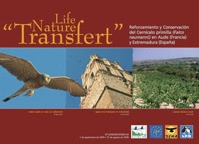Reinforcement and Conservation of the Lesser Kestrel (Falco naumanni)
in Aude, (France) and Extremadura (Spain).
4. Presentation and the function of the participants
This particular LIFE programme brings together many different associations. The French organisation LPO (Ligue pour la Protection des Oiseaux) functions as the technical and financial coordinator and also arranges a part of the communicational activities (pamphlets and seminaries). It keeps in contact with the environmental administrators of the European Union and the Oréade-Brèche office, which is in charge of the LIFE Programme projects in France. Six local functionaries see to the practical realization of the plans and two different parties guarantee the scientific analysis and surveillance.
- LPO (Ligue pour la Protection des Oiseaux) is responsible of the project in Aude. This includes surveillance of the reintroduction, making a guide for the control of habitats and different activities for the general informing of the public.
- DEMA (Defensa y Estudio del Medio Ambiente) is responsible of the development of the project in Spain. Furthermore it functions as a technical adviser in the matter of reintroducing Lesser Kestrel in Aude, especially when it comes to the design, construction and functioning of the French breeding centre.
- UFCS (Unión Française des Centres de Urgences) is in charge of the works in the French breeding centre (construction, activities and maintenance).
- LPO PACA (Ligue pour la Protection des Oiseaux delegacion regional Provence-Alpes-Côte d’Azur) will provide the pedagogic tools and material for working with different types of collectives (children, homeless people…)
- ACPP (Associatión de Chasseurs et Propriétaires Pérpignanais) is in charge of weeding the low mountain area and the abandoned vineyards in order to increase the amount of insects for the alimentation of the Lesser Kestrel and other raptors
- PNRNM (Parc Naturel Régional de la Narbonnaise en Méditerranée) together with LPO Aude will see to the informing of local people about the effects of the reintroduction programme
- CNITV (Centre National d’Informations Toxicologiques et Vetérinaires) is in charge of the veterinary and toxicology analyses
- UPMC (L’Université Pierre-et-Marie-Curie) is responsible of the scientific surveillance of the project. They will guarantee the dynamic analysis of populations and the viability of the reintroduced population
This particular LIFE project receives financial support also from:
- The European Commission
- DIREN (Directions Regionales de l'Environnement de Languedoc-Roussillon)
- Consejo Regional de Languedoc-Roussillon
- …and the generous support of the collaborators of LPO and DEMA





